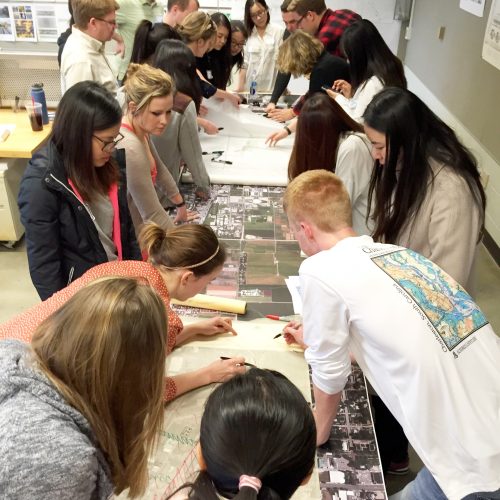A Flexible Curriculum
Our curriculum offers flexibility. Students can design a program that matches their professional goals and obtain their graduate degree in only 2 semesters. This program provides a 1-year (9 months), full-time, in-residency degree.
Urban management professionals stand at the forefront to accommodate for rapid changes. Through the MSSUM program, you’ll learn the analytical and strategic skills essential for today’s midcareer professional to manage urban areas.
MSSUM students complete a total of 32 hours. Per the Graduate College Handbook, at least 12 of these hours must be at the 500-level or greater and approved for graduate credit (including thesis, research, or independent study credit), and 8 of these 12 hours must be in the major.
16 hours of required Core Courses
- 12 hours of specialized courses in one or more Primary Areas of Study
- 4 hours of Electives

MSSUM Core Courses (16 hours)
The 4 core courses build a common base of knowledge for midcareer professionals working on a variety of urban issues. These required classes address fundamental challenges confronting urban areas. The core introduces students to:
- an overview of current urban issues and challenges
- theory and interpretation of human settlement from several disciplinary perspectives
- practical skills that urban managers need to analyze challenges and understand regional trends

Fall Semester
Provides students with a historical and international comparison of the origins and evolution of cities, the process of urbanization, and the human endeavor to effect urban growth and change. Topics covered include history of urban physical form and planning efforts, equity issues of urban spatial arrangement, and elements of urban physical form. Students critically reflect on the historical evolution of cities and how this relates to current issues in a series of assignments.
Provides students with recent research in contemporary changes, emerging trends, and new challenges in environmental sustainability, housing, economic development, and other core fields of urban management. Students develop research proposals that become the basis for research practicums in UP 513.
Spring Semester
Familiarizes students with the techniques, data sources, and skills for analyzing regions as economic, social, and spatial systems. The course’s first half focuses on understanding current conditions and trends. The second half centers on forecasting most likely and alternative futures. Students apply these skills to the characterization and analysis of chosen regions and issues.
Helps students apply quantitative and qualitative reasoning and analysis techniques to problem identification, researching and detailing alternatives, and selecting policy and intervention approaches within real-world constraints. Throughout the course, students assess and workshop projects, culminating in a final report and presentation.
Primary Area of Study (12 hours)
Students develop specialized knowledge and expertise in one or more sub-fields. Courses in a Primary Area of Study examine policy interventions and provide the tools needed to critically evaluate these programs.
Subject areas:
- Regional Systems and Informatics
- Energy and Environment
- Governance and Community
Electives (4 hours)
Students choose electives to explore additional topics and acquire new skills. A wide range of options include:
- Geographic Information Systems (GIS)
- Watershed ecology and planning
- Economic development
- Plan making
- Historic preservation
- Community development
- Urban design
- Transportation planning
- Bike and pedestrian planning
- Scenario planning
- sustainability
- land use planning and policy
- physical planning
- energy and the built environment
- real estate development fundamentals
Estimated Program Costs
This 1-year program is for midcareer professionals who are able to pay full tuition costs. No tuition waivers are available for this program.
2021-22 Academic Year Tuition: $29,614 (resident and non-resident)
- Campus fees*: $5,020
- Room & board: $13,314
- Books & supplies: $1,800
- Other**: $3,090
* Includes approximately $1,832 for student health insurance which can be waived at student request and upon University approval.
** Includes allowances for transportation, clothing, recreation, and other living or miscellaneous expenses. These expenses vary greatly based on the individual student’s lifestyle, and the allowance is based on what are considered reasonable but modest costs after surveying segments of our student population.
Questions?
Dr. Dustin Allred
MSSUM Coordinator
Department of Urban and Regional Planning
University of Illinois at Urbana-Champaign
111 Temple Buell Hall, 611 E Lorado Taft Dr, Champaign, IL 61820
Voice: 217-333-6531
Email: dallred2@illinois.edu